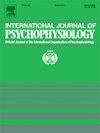The neural correlates of emotion processing and reappraisal as reflected in EEG
IF 2.5
3区 心理学
Q3 NEUROSCIENCES
引用次数: 0
Abstract
Successful reappraisal modulates the impact of emotion-inducing stimuli through reinterpretation of their meaning and decreases subjective emotional experience. Here the question is addressed how the altered emotional experience is related to altered electro-cortical responses, and about the neural mechanisms underlying regulation itself. To this end, we recorded EEG during a cued emotion-regulation paradigm including negative and neutral pictures. Firstly, based on hypothesis-driven analysis of the Late Positive Potential (LPP), we found that the early fronto-centro-parietal LPP (400–1000 ms) increased when passively viewing negative versus neutral pictures. Reappraisal did not decrease this LPP. Instead, only during reappraisal, the emotion effect on the parietal LPP was sustained until the picture offset. Secondly, we applied a localizer approach to uncover reappraisal effects with other spatiotemporal characteristics than the traditional LPP but did not observe such effects. Despite indications of theta oscillations being associated with cognitive and/or affective control, no significant effects were found on theta activity for emotion processing or reappraisal. Our findings suggest that emotion regulation may affect the LPP in several ways, depending on the task design and including affective as well as more cognitive influences. A potential role for theta in emotion regulation remains to be elucidated.
情绪加工与重评的神经关联在脑电图上的反映。
成功的重新评价通过重新解释情绪刺激的意义来调节情绪刺激的影响,减少主观情绪体验。这里的问题是,改变的情绪体验是如何与改变的电皮层反应相关的,以及关于调节本身的神经机制。为此,我们记录了在暗示情绪调节范式下的脑电图,包括消极和中性图片。首先,基于假设驱动的后期正电位(LPP)分析,我们发现被动观看消极和中性图片时,早期额-中央-顶叶LPP(400-1000 ms)增加。重新评估并没有降低LPP。相反,只有在重评价时,情绪对顶叶LPP的影响才会持续到图片被抵消。其次,我们采用定位器方法揭示了与传统LPP相比具有其他时空特征的重评价效应,但并未观察到这种效应。尽管有迹象表明θ波振荡与认知和/或情感控制有关,但在情绪处理或重新评估的θ波活动中没有发现显著的影响。我们的研究结果表明,情绪调节可能以多种方式影响LPP,这取决于任务设计,包括情感和更多的认知影响。θ波在情绪调节中的潜在作用仍有待阐明。
本文章由计算机程序翻译,如有差异,请以英文原文为准。
求助全文
约1分钟内获得全文
求助全文
来源期刊
CiteScore
5.40
自引率
10.00%
发文量
177
审稿时长
3-8 weeks
期刊介绍:
The International Journal of Psychophysiology is the official journal of the International Organization of Psychophysiology, and provides a respected forum for the publication of high quality original contributions on all aspects of psychophysiology. The journal is interdisciplinary and aims to integrate the neurosciences and behavioral sciences. Empirical, theoretical, and review articles are encouraged in the following areas:
• Cerebral psychophysiology: including functional brain mapping and neuroimaging with Event-Related Potentials (ERPs), Positron Emission Tomography (PET), Functional Magnetic Resonance Imaging (fMRI) and Electroencephalographic studies.
• Autonomic functions: including bilateral electrodermal activity, pupillometry and blood volume changes.
• Cardiovascular Psychophysiology:including studies of blood pressure, cardiac functioning and respiration.
• Somatic psychophysiology: including muscle activity, eye movements and eye blinks.

 求助内容:
求助内容: 应助结果提醒方式:
应助结果提醒方式:


